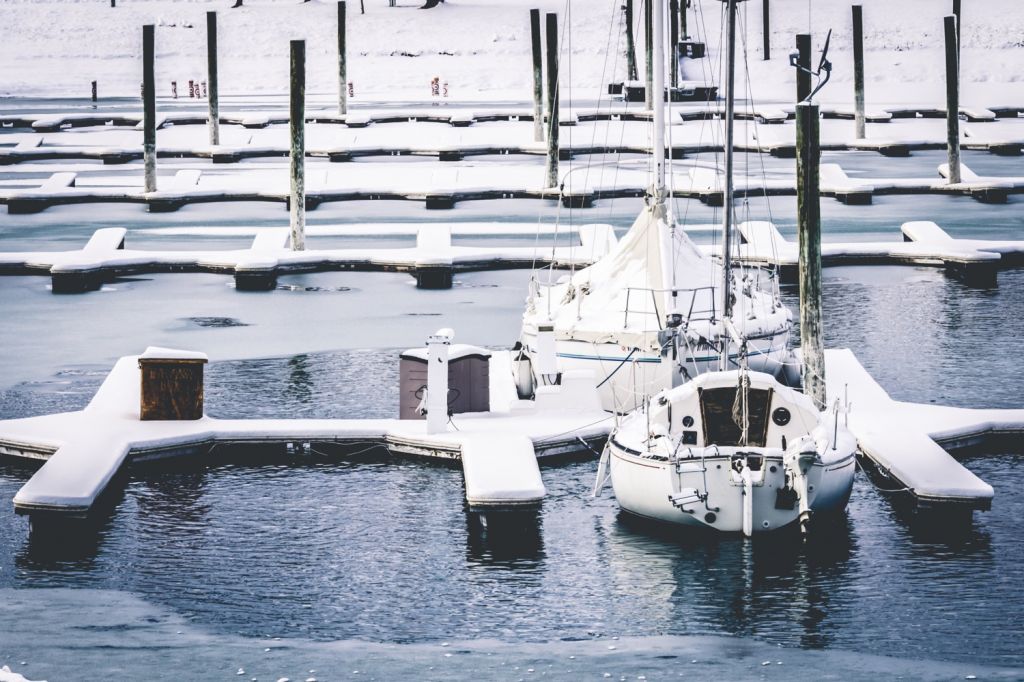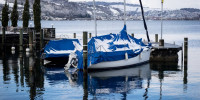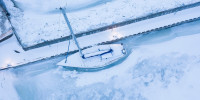Do You Have to Use Antifreeze to Winterize a Boat?
Though proper marine antifreeze isn't expensive, they aren't giving the stuff away. With the ongoing expenses of owning a boat, spending six bucks a gallon for jugs of disposable pink stuff every winter adds up.
Do you have to use antifreeze when you winterize your boat? You should use antifreeze to winterize your boat if you have an inboard engine or any systems with pipes or that carry water. You should also consider using it in your bilge. For outboard motors, you don't have to use antifreeze. Make sure to use the right type. Auto antifreeze should be avoided.
If you have a simple boat with few systems, you shouldn't need it. And there are steps you can take if you don't want to use it, or live somewhere with low freezing risks.

On this page:
Why Use Antifreeze?
Water expands when it freezes. This provides a very high and almost irresistible force which can burst hoses, break plumbing, and even crack engine blocks. Expanding water can exert thousands of pounds per square inch of force against anything constraining it.
Antifreeze in all the spaces where water sits prevents freezing and expansion, protecting your boat's systems from damage.
By flushing and filling all water containing or using systems on a boat, you displace water from areas that may be harmed by freezing. Even bilge pumps can be damaged if water in the bilge freezes.
What Is Marine Antifreeze?
Marine antifreeze is a special, non-toxic mix of chemicals designed to prevent ice formation. The better quality antifreezes use propylene glycol, though some will use a propylene glycol/alcohol blend.
The temperature rating of any antifreeze is the burst point, the temperature where a copper pipe filled with the antifreeze will burst. Well before the burst point the antifreeze may form an icy slush, but this does not expand and does not harm pipes and constricted spaces.
The critical difference between this antifreeze and engine or automotive antifreeze is its toxicity. Propylene glycol is non-toxic to humans and animals, biodegradable, and doesn't have a strong taste or smell.
Ethylene glycol, used in engine and automotive antifreeze, is toxic and can cause death, blindness and other illnesses in humans and animals. It should never be released into the environment and takes care to dispose of properly. This is "engine coolant" and should never be used for anything else.
For more information on the exact differences between the two, Elizabeth has written an in-depth explanation here.
Pink, Blue, and Purple Stuff
Propylene glycol based antifreezes come in different colors. The colors often reflect the relative strengths of the antifreeze - how cold can it be before the antifreeze no longer provides protection? There is no set standard for colors and temperatures, but there are some rough conventions they are not always followed by all manufacturers.
- -50F (-45C) antifreeze is usually pink, and the least expensive. It's suitable for freshwater systems, and can be used in engines but isn't optimal.
- -60F (-51C) is often purple or a darker pink. Better for engines, but also suitable for water systems.
- -100F (-73C) Often blue or greenish blue, may still be pink. Good for engines and bilges, though still usable for freshwater systems.
- -200F (-129C) May be bluish green. They often sell this as a concentrate to dilute to specific protection requirements. Can be used in any role.
You need to read the label, though price is often a tipoff with the more expensive antifreezes having a lower burst point.
How Can I Winterize My Boat Without It?
This depends on where you store your boat, and what systems you have installed.
Situations where you may not need antifreeze include:
- Boats stored indoors, where temperatures are above freezing
- Places with near zero risk of extended freezing temperatures over the winter.
- Your boat does not have in inboard engine, a freshwater system, or any more complex systems which pump water.
A nighttime drop to 30F (-1C) probably won't cause you problems, but if it stays below freezing during the day or for several days, you will regret not using antifreeze. Extended periods of freezing weather are the most problematic, but if you do not store your boat where it can freeze, you should be okay.
Winterizing Techniques to Avoid Using Antifreeze
Although riskier, you can take some steps to prepare your boat for winter in freezing conditions without using antifreeze.
I do not recommend this in freeze risk areas, proper application of antifreeze is the safest method to prevent damage to boat systems over the winter in areas with a risk of freezing. But if finances restrict you or you can not get the proper antifreeze to your boat, or you live in a low freeze risk area, there are a few things you can do to help if an unexpected freeze comes without putting antifreeze in everything.
- Suck or blow out all your water lines. With a shop vacuum you can try to remove all water from your boat systems lines. Drain the water tanks and connect the vacuum at the distribution point from the tanks. Open all fittings and blow the water through, or suck it out. Leave the fittings open, they're less likely to freeze when open.
- Drain all water reservoirs. Engines are tricky, as they usually design them to drain the coolant from the freshwater cooled side, but often there is no facility to drain the raw water jackets. You may blow or suck the water out with a shop vacuum connected to a hose in the raw water system once the boat is out of the water. You may have to disconnect hoses to connect the shop vacuum.
- Store the boat inside, where it can't freeze.
- Consider wet storing your boat, if the water doesn't freeze. It won't fully protect you from freezing, but a boat in the water is less subject to the air temperature. It will still get cold, and things will freeze if untreated in a deep freeze, but there is less variation with quick cold snaps so some of these techniques may be more effective.
- Place electric heaters on the boat if a freeze is expected. Be careful, you do not want to start a fire. The boat need not be kept warm, but engine and system spaces need to be above freezing. Open cushions and lazarettes to expose water lines.
Alternatives to Marine Antifreeze
Are there any less expensive, better alternatives to marine antifreezes? Maybe.
Booze!
The first antifreezes were alcohol, and any vodka connoisseur will tell you good vodka doesn't freeze like water, it just gets thicker. So is alcohol for drinking a good alternative to antifreeze? (Note: do not consider any non-potable alcohol for this.)
Pros:
- Non toxic. If you put vodka in your drinking water tanks, it's nothing you couldn't put in a glass with tonic water and a slice of lime.
- Sanitizing. Alcohol can kill germs and offer some protection and cleaning in the tanks and lines.
- No added taste. Even "tasteless" pink antifreeze has a taste and smell. You won't get this with alcohol, unless you winterize with gin or some other non-neutral alcohol.
- Cost. Some bargain hooches can cost less than a gallon of quality antifreeze.
- Less flushing in the spring. See "taste."
Cons:
- Inferior protection. Pure ethanol, the alcohol we drink, freezes at -173F (-114C). Sounds good, but you won't be winterizing your boat with pure grain alcohol. 80 Proof vodka is only 40% ethanol and has a freezing point of -17F (-27C). While no one publishes a "burst point" for rotgut vodka, this is less protection than the cheapest -50F propylene glycol.
- May still freeze. If you want to use alcohol, put a bottle of it in your freezer at home for a couple of days to be sure it's high enough quality to at least not freeze down to 0F (-18C).
- Costs. Cheaper alcohol has less ethanol than the good stuff. At 64 proof the freeze point comes up to -10F (-23C), 40 Proof freezes at 22F (-7C) and may freeze solid in your household freezer. If you winterize with gallons of Ketel One or Everclear, you will surpass the costs of marine antifreeze.
- Evaporation. Ethanol evaporates more readily than propylene glycol. There is a risk you will have less protection than you think if you lose some or all of your antifreeze over the winter.
- Seal damage. Ethanol has been known to damage some types of rubber seals; be careful if you don’t know your seals are ethanol proof.
Vodka has proven an effective winterizing alternative for fresh water drinking systems in moderate climates. I wouldn't use it in my engine, and I wouldn't use it if I lived up in Maine, Minnesota, Michigan, Canada, or any place with harsh winters.
RV Antifreeze
It's a well known secret that things made for the Recreational Vehicle market often cost less than the same or similar item with "Marine" on the package. We've shopped RV stores for electrical, plumbing, and propane parts with good success.
The good news about RV Antifreeze is that you can use it in your boat. And you may save a buck buying something with "RV" on the label or shopping at a big box store instead of a chandlery.
The bad news? It's exactly the same stuff as marine antifreeze. You aren't getting away from marine antifreeze, you're just saving a little money.
Did you find the answer to your specific question?
👍 3 👎 1


Leave a comment